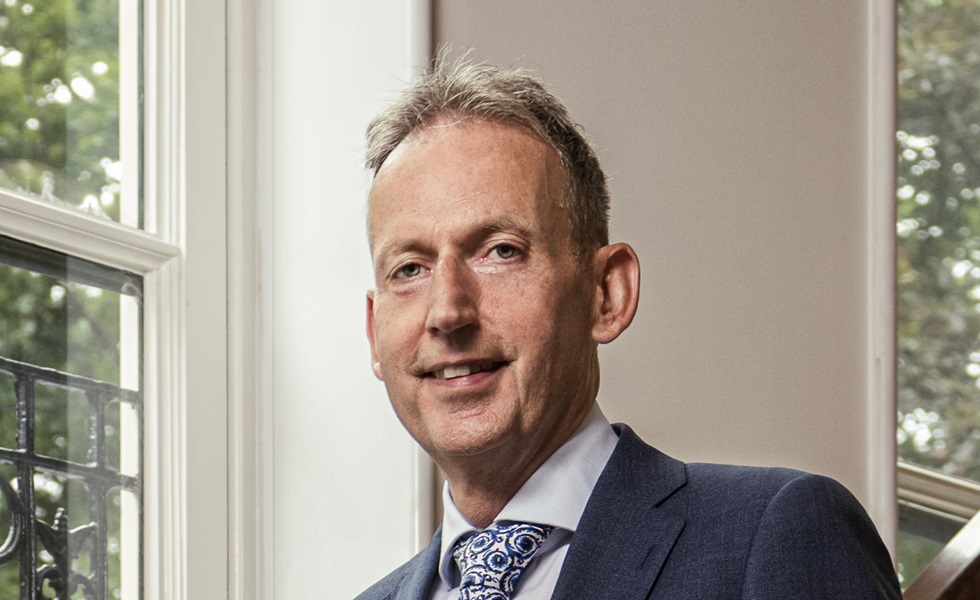Norbert Bol: Sustainable investing in real assets requires a holistic view and cooperation
Norbert Bol: Sustainable investing in real assets requires a holistic view and cooperation

This interview was originally written in Dutch. This is an English translation.
Norbert Bol, founder of Building Values and Partner External Manager Selection at R / A Wealth Advisors, is a celebrated expert in the field of real assets. In an interview with Financial Investigator, he looks back on his career – from the liberalisation of the European property market to the rise of sustainability and new technologies – and shares his vision on the role of real assets in a future-proof investment strategy.
By Harry Geels
How has your background contributed to your development as an expert in real assets?
'Let me start by saying that I have experienced unique developments in my long career, with special learning moments, such as European unification, globalisation, the scaling up of institutional investors, the shift to indirect investment – with pension funds moving away from direct investments in favour of funds – and, of course, the credit crisis, which was caused by a property bubble. Thanks to the various roles I have been able to fulfil, I can view real assets from different perspectives and understand the connections between them.
My experience with international investments began when Europe “opened up”. At the start of my career, which began in 1990, I had the opportunity to work for investors, project developers, builders, suppliers and governments in various countries, including Germany, France, the Czech Republic, Spain and the United Kingdom. This experience has helped me to better understand the value chain and build an international network. I still receive long-term assignments because clients themselves do not have, or no longer have, the comprehensive knowledge and experience.
Trained as an architect and business administrator, my initial interest was in real estate, a special investment category that involves a great deal. Thanks to my background in architecture, I understand the technical aspects, while my knowledge of business administration enables me to make strategic decisions. My interest in infrastructure and natural capital was a logical continuation of my work in area development, but was also fuelled by international investors who had already recognised these categories as attractive investments much earlier. Both are also illiquid, physical asset classes that require a multidimensional approach to achieve good investment results.'
Why are real assets a special asset class?
'Real assets have a return that lies between that of bonds and equities. This quickly raises the question: ‘What is the asset class needed for?’ Early in my career, I once experienced an ALM study that indicated that all real estate should be sold because there would be too little added value. The board was also reluctant to invest in real estate. The prevailing view was that listed shares would perform better in the long term. What’s more, there were also listed real estate companies. I strongly objected to this. The ALM study was redone with more realistic assumptions about risk and diversification, and the real estate portfolio was retained, which later proved to be extremely beneficial for the fund.
Collaboration is about finding common goals and working on solutions that benefit everyone.
Real estate and other real assets offer good diversification in an investment portfolio, and I have come to refer to the return (between equities and bonds) as social return, because real assets are valuable to society. For example, real estate investments contribute to society by creating homes and workplaces that would otherwise be inaccessible. Later, an impact dimension was added. Of course, investing in real assets comes with challenges, for example in terms of climate risks, costs and liquidity. It is therefore important to assess real assets holistically and to spread assets across regions and sectors, and across different vintages over time. This helps to reduce risks and take advantage of opportunities in different markets.'
What are the most important considerations when investing in real assets?
'It is important that there is genuine diversification from equities and bonds and that the social return and risk are appropriate. During the financial crisis in 2008, for example, it became apparent that too many economic and financial risks were being accepted in real estate. Due to excessive leverage and excessive dependence within the financial sector on locations and tenants, there was insufficient diversification and a negative return. Reduced diversification in the portfolio can also occur in infrastructure if too much energy price risk is accepted.
The final investment result is largely determined by a good combination of the destination, location, physical quality, tenants or customers, accessibility and economic conditions. The location has gained in importance in view of the climate transition. If a location is exposed to increasing natural disasters, this may affect its future value. It is important to carry out thorough due diligence to ensure that the investment is future-proof.
Do not finance real assets too much with loan capital, or only to a limited extent and only in certain circumstances.
Furthermore, a long-term vision is essential. Real assets are an illiquid asset class. It can be difficult to sell assets quickly when the market changes. It is important to be patient and have a long-term vision in order to benefit from the advantages of the asset class, such as diversification and social returns. Finally, another point: do not finance real assets too heavily with debt, or only to a limited extent and only in certain circumstances. With too much debt, the investment becomes partly a financial product with other diversifying characteristics and additional risk factors are unintentionally added. In real estate, it is important to look more closely at the term of the debt in combination with the remaining terms of the leases, and at the actual rent in relation to the market rent.'
What are the most important trends in real assets at the moment?
'The most important trends are sustainability and technological innovation, especially now with AI. Sustainability is now more frequently on the agenda for real assets than for any other investment category. Sustainability is primarily about creating healthy living environments in which real estate, infrastructure, agriculture and forestry play an important role. A holistic approach to sustainability not only delivers financial benefits, but also contributes to a healthy future for everyone.
Technology will play an increasingly important role in sustainability. Smart data analysis and artificial intelligence can make investments more efficient and profitable. Think of more predictable and lower energy consumption by linking to expected weather conditions, smart energy consumption because buildings are linked to the batteries of parked electric cars, but also the establishment of short chains in agriculture, making local products more accessible.'
How important is it to collaborate with other parties in the field of sustainability?
‘Collaboration is essential. Sustainability is a complex and multifaceted subject. That is why it is important to collaborate with other parties to find the best solutions. Technology makes many things possible, but through collaboration we can benefit from the expertise and experience of others and work together to build a better future. Collaboration is about finding common goals and working on solutions that benefit everyone. Sustainability in real assets could be defined as the best financial result in terms of return and risk.
Sustainability in real assets could be defined as the best financial result in terms of return and risk.
What are the main challenges, apart from dealing effectively with trends in technology and sustainability?
'One of the most important challenges is managing risks, for example through the aforementioned forms of diversification. There is the illiquidity risk. In addition, there are many different factors that influence the value of real assets, such as economic conditions, regulations and technological developments. It is important to understand and manage these factors in order to be successful in this category.
Another important challenge is controlling costs. This is due, on the one hand, to increasing requirements and regulations and, on the other hand, to the necessary acquisition and execution power. Economies of scale are seen in the market as an important condition for operating successfully and at low cost in real assets. This enables large investors to invest in the right systems and the right people. Moreover, this makes it possible to take advantage of acquisition opportunities in all market conditions and thus be a reliable partner in the market.'
What does your future look like?
'I still find it very motivating to share knowledge and experience with others and thus further expand my business. I also remain active as a lecturer. During my Business Administration studies, we were advised to have a side job in addition to our work and thus “always have one foot outside”. For that reason, I started teaching after graduating and I still do. Teaching keeps you actively involved in new knowledge and insights. It also keeps you involved with each new generation that graduates and spreads out across the broad field.
My future plans mainly focus on a holistic approach to real assets in the investment portfolio. One of the most important aspects of this is to focus on collaboration and added value in order to make the difficult transition to a healthy living environment in social, ecological and financial terms. New technologies and innovations will play an increasingly important role in this. It is inspiring to see the progress that is being made. That gives hope for the future. All in all, I expect to continue to contribute to the use of this attractive investment category in investment portfolios, for the benefit of the results. Sustainable results, that is.'
|
Norbert Bol Norbert Bol is the founder of Building Values, a consultancy firm specialising in real assets, and Partner External Manager Selection at R / A Wealth Advisors. Bol studied Architecture at The Hague University of Applied Sciences and Business Administration at Erasmus University. |










